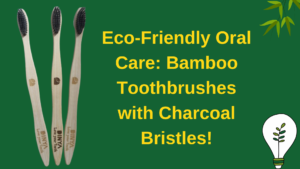No products in the cart.: ₹0.00
Bamboo vs. Plastic: The Battle for a Greener Smile
Introduction: Bamboo vs. Plastic
Picture this: every toothbrush you’ve ever used still exists somewhere on this planet. That’s the reality of plastic toothbrush waste. With millions being discarded every year, it’s time to rethink our choices. Enter bamboo toothbrushes—a sustainable swap that’s taking the eco-conscious world by storm. But are they truly as green as they claim? Let’s dig into the numbers and see if bamboo can really brush away the plastic problem.

The Problem with Plastic Toothbrushes
Plastic toothbrushes have long been a staple, but they come with an environmental price tag:
- A Century of Waste: Traditional toothbrushes are made from polypropylene and nylon, materials that take over 400 years to decompose.
- Landfill Overload: The American Dental Association estimates that nearly 1 billion plastic toothbrushes are trashed annually in the U.S. alone, contributing to massive landfill overflow.
- Oceans in Crisis: These plastic remnants eventually break down into microplastics, polluting marine ecosystems and threatening wildlife.
Why Bamboo Brushes Are a Breath of Fresh Air
Bamboo toothbrushes bring multiple eco-friendly benefits to the table:
- Nature’s Fast-Growing Wonder: Bamboo grows at an astonishing rate—some species can grow up to 3 feet in just 24 hours—making it a highly renewable resource.
- Biodegradable Brilliance: Unlike plastic, bamboo handles decompose in 3 to 6 months when composted properly.
- Carbon Capturer: Bamboo absorbs 35% more carbon dioxide than similar-sized trees, making it a powerful ally against climate change.
- Less Plastic, More Impact: A global shift to bamboo toothbrushes could prevent billions of plastic toothbrushes from clogging landfills and oceans every single year.
Battle of the Brushes: Bamboo vs. Plastic
| Feature | Plastic Toothbrush | Bamboo Toothbrush |
| Material | Polypropylene, Nylon | Bamboo, Plant-based bristles (optional) |
| Biodegradable | No | Yes (handle) |
| Decomposition Time | 400+ years | 3-6 months |
| Sustainability | Petroleum-based, non-renewable | Fast-growing, renewable |
| Environmental Impact | High waste, microplastic pollution | Low-waste, compostable |
The Challenges of Going Bamboo
Even the most sustainable choices have their trade-offs:
- Carbon Footprint Considerations: Many bamboo toothbrushes are produced in Asia and shipped worldwide, adding transportation emissions to their environmental cost.
- Price Factor: Bamboo toothbrushes often cost more than plastic ones due to their ethical and sustainable production processes.
The Verdict: Should You Make the Switch?
Absolutely! While not a flawless solution, bamboo toothbrushes drastically reduce plastic waste and support sustainability efforts. By making this small switch, you contribute to a bigger movement—a world less dependent on plastic and more in tune with nature. The planet (and your morning routine) will thank you for it!

